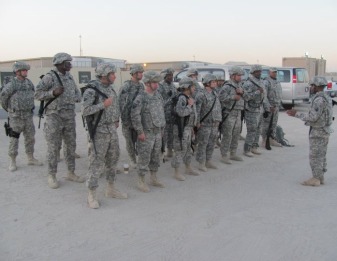English teacher Matt Brashears explains true recognition for those who serve in the military
with Veterans Day and Thanksgiving approaching, some students on campus look for ways to show their appreciation for the men and women in the United States military. English teacher Matt Brashears has provided one way to do so with his open-participation letter-writing campaign.
Brashears feels a personal motivation to support the armed forces, as his father is a member of the Army Reserves. Originally a policeman, he has been on active duty for the past three years, serving in Afghanistan, locally in San Jose, and in his current location, Kuwait. 
ìWhen you sign up for the Army Reserves, [the 3-year deployment] is not what you expect,î Brashears said. The extended tour has been a strain on the family, but it rallies with support. Brashearsí mother is the co-leader of the family readiness program for her husbandís unit, a group that helps families adjust when their loved ones are called into military service and ensures that the troops receive moral support from home. When she asked Brashears to add a letter to the care packages that she plans to send, he was inspired to include his students as well.
ìI was like, ëI see a lot of people every day,íî Brashears said. ìWhy shouldnít they be able to help out?î He believes that a supportive letter doesnít have to be from a family member to be valuable.
Brashears understands the positive impact that a letter can have, because he also knows what itís like to be called into service. In his college years, he served as a missionary in Brazil. During his time abroad, phone and Internet access were unreliable, so letter-writing became his primary means of communication with his friends and family in the United States. While it may seem old-fashioned, Brashears maintains that a letter is one of the best ways to connect with someone who is separated by distance and circumstance.
ìEspecially that far from home, having to make a lot of the sacrifices that they are having to make, itís really beneficial to know that people care,î Brashears said. ìGetting mail always cheers people up.î
So he announced the completely voluntary project to his students on Oct. 22. Letters were due by the end of the following week, with only two of his students choosing to participate. Thatís a disappointment because Brashears believes that writing a letter would benefit the students as well as the soldiers.
ìWe live a sheltered life here in Cupertino,î Brashears said. ìIt would be good for [students] to remember that there are things going on in the world. There are wars overseas. Weíre still fighting these wars.î He knows he could potentially increase participation by offering incentives such as extra credit, but believes there isnít any benefit to either party unless the letter is genuine.
This batch of letters will arrive in time for Thanksgiving, and a second campaign is planned for around Christmas. Brashears hopes to team up with the Matadors on the Home Front club to promote the next letter-writing opportunity and increase the participation level by increasing student awareness across campus








